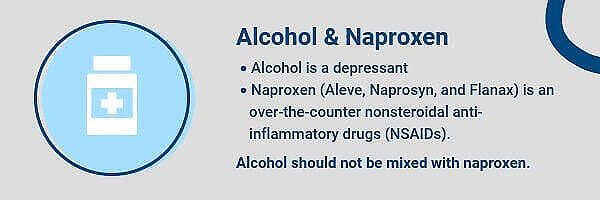
Naproxen and Alcohol
Naproxen, an NSAID (non-steroidal anti-inflammatory drug), has the potential to provide great relief for muscle and joint pain or inflammation.

This comprehensive guide aims to educate you on the potential hazards of combining naproxen with alcohol and how to identify the associated risks in yourself or a loved one.
Is it safe to drink alcohol while taking Naproxen?
As per the NHS, consuming alcohol alongside naproxen is generally acceptable as long as it is done moderately. Hence, it is crucial to be vigilant about your naproxen and alcohol consumption, ensuring you do not exceed the recommended limit.
If you are taking Naproxen, it is wise to watch your alcohol intake, ideally avoiding alcohol altogether. The main reason is that as a strong anti-inflammatory drug, naproxen can cause issues with your stomach, which are more likely to occur or worsen if you drink alcohol.
How much alcohol can I consume while taking Naproxen?
The quantity of alcohol units suggested for an individual may vary compared to what is recommended for another person.
This discrepancy is due to various factors, including a person’s:
- Gender
- Age
- Overall health
Considering these factors, it becomes challenging to provide an exact number indicating the level of alcohol consumption that may pose a risk. Therefore, we strongly advise seeking advice from a healthcare professional for personalized guidance.
Nevertheless, from a broader viewpoint, the guidelines regarding alcohol suggest that adults should not exceed 14 alcohol units per week.
This amounts to:
- Six medium glasses of wine per week
- Six pints of beer per week
- Seven 50ml measures of spirits (such as vodka, gin or whiskey) per week
Side-effects of taking naproxen with alcohol

Naproxen is favoured over opioid painkillers as it is non-addictive and has fewer side effects. However, this does not mean that Naproxen is side effect-free or suitable for everyone.
It can safely treat chronic and long-term pain conditions when prescribed in a gastro-resistant form and when taken exactly as prescribed.
Gastro-resistant naproxen helps to prevent damage to the stomach and intestines from long-term use. Even then, medically, it is advised to keep alcohol consumption to a minimum, ideally avoiding alcohol altogether.
The most common side effects associated with taking naproxen & alcohol are:
- Dizziness
- Nausea
- Vomiting
- Stomach pains
- Abdominal bleeding
- Heartburn
- Faintness
- Water retention
- Cardiovascular issues
Like most NSAIDs, naproxen can cause inflammation of the stomach’s lining. This can lead to stomach pain, bleeding, acid reflux and ulcers.
Likewise, excessive alcohol consumption is also known to cause inflammation of the stomach lining – a medical condition known as gastritis.
Those who regularly consume above the Chief Medical Officer’s safer drinking guidelines of no more than 14 units of alcohol a week spread out evenly will be more susceptible to developing gastritis.
Combining naproxen and alcohol will make you more prone to several high-risk conditions associated with the stomach and intestines. Developing gastritis, which often is accompanied by some very uncomfortable symptoms, is just one of the many ailments that can develop.
Gastritis typically includes symptoms of:
- stomach pain,
- fullness
- acid reflux
- nausea
However, not everyone experiences symptoms. Just because you do not have any symptoms from drinking alcohol with naproxen does not mean that combining the two is not causing you harm.
Left untreated, gastritis can lead to serious health complications, including ulceration and internal bleeding.
The risks of Gastritis – if you mix naproxen and alcohol

As explained, combining alcohol and naproxen regularly greatly increases your chances of developing gastritis – inflammation of the stomach lining.
Gastritis can cause some other serious health complications.
The risks associated with gastritis include:
- Ulceration of the stomach lining and intestines
- Bleeding in the stomach and intestines will lead to pain and passing black, tarry-like stools. You may also vomit blood.
- Vitamin B12 deficiency due to malabsorption. This can lead to nerve damage and the onset of Wernicke’s Encephalopathy.
- Iron deficiency due to malabsorption. Iron deficiency can cause mental health issues, breathlessness and severe lethargy due to your organs not getting enough oxygen.
- Gastritis can cause irreversible damage to the stomach and intestines
- Growths and tumours in the stomach place you at higher risk of stomach cancer.
Gastritis is a condition that can easily be avoided by not combining alcohol with naproxen and by reporting any stomach-related side effects of naproxen to your doctor.
If you have ever previously suffered from stomach ulcers, it may not be safe for you to take them.
The short-term and long-term effects of combining alcohol and naproxen
Mixing alcohol and naproxen together can have short-term, immediate and long-term, sometimes permanent or even fatal effects.
The effects include, but are not limited to:
- Nausea
- Blurred vision
- Stomach pain
- Dizziness
- Difficulty urinating
- Gastritis
- Vomiting
- Hypertension
- Ulceration of the gastrointestinal tract
- Cardiovascular problems
- Renal failure
- Heart attack
- Stroke
- Perforation of the stomach lining or intestines
- Permanent damage to the gastrointestinal tract
- Internal bleeding
- Water retention
- Salt depletion
- Thrombosis
- Vitamin deficiencies, including vitamin B12 deficiency and iron deficiency
- Electrolyte imbalances
- Death
The more alcohol you drink and the higher dose of naproxen/longer duration of treatment, the more at risk you are of developing any number of serious health complications.
To reduce the risk of developing the above, alcohol should be avoided whilst taking naproxen.
If you are alcohol dependent or suffer from an alcohol use disorder, please do not take naproxen.
Who should avoid naproxen?
Whilst generally a very safe drug, Naproxen is not suitable for everyone. For this reason, you should always consult your doctor or pharmacist before taking the drug.
Naproxen is known to have serious interactions with certain medications. It is, therefore, important that your doctor and pharmacist are aware of any other medications or drugs you are taking, prescribed or not.
Naproxen is generally not suitable for those with the following health conditions:
- Those with a current alcohol use disorder. It is important to keep alcohol intake to a minimum, ideally avoiding it altogether. If you cannot control your alcohol intake, it is best to avoid it altogether.
- Those that have heart disease or have previously suffered thrombosis or a stroke. NSAIDs can increase the risk of thrombotic events, stroke and cardiovascular problems.
- Those with breathing problems or who suffer from asthma. It should be used cautiously as it can lead to a greater risk of breathing difficulties.
- Those who have ever suffered from gastritis or stomach ulcers. Naproxen increases the chances of suffering a recurrence or worsening of these conditions. This can ultimately lead to perforation of the stomach lining or intestinal walls, which can be fatal.
- Elderly patients, pregnant women and children should be observed whilst taking it as they are at higher risk of gastrointestinal problems.
- Those who are taking other NSAIDs, including ibuprofen and aspirin. Many cold and flu remedies also contain NSAIDs; always check with your pharmacist.
- Those who suffer from any bleeding disorder.
- Those with an allergy to aspirin or who regularly take aspirin.
- Those who suffer from renal impairment or are taking diuretic medication.
Please consult your doctor if you suffer from any of the above conditions.
Need help with an alcohol problem?
If you are worried that you may be drinking too much or cannot control your alcohol intake, professional help is at hand.
Free support for an alcohol problem can be accessed through your doctor or local drug and alcohol services. Alternatively, immediate, tailored professional alcohol treatment is available by contacting us at Detox Plus.
We at Detox Plus specialise in professionally treating alcohol use disorders – privately, effectively and confidentially. Call us today for a free assessment of your alcohol treatment needs and immediate expert advice and support.

